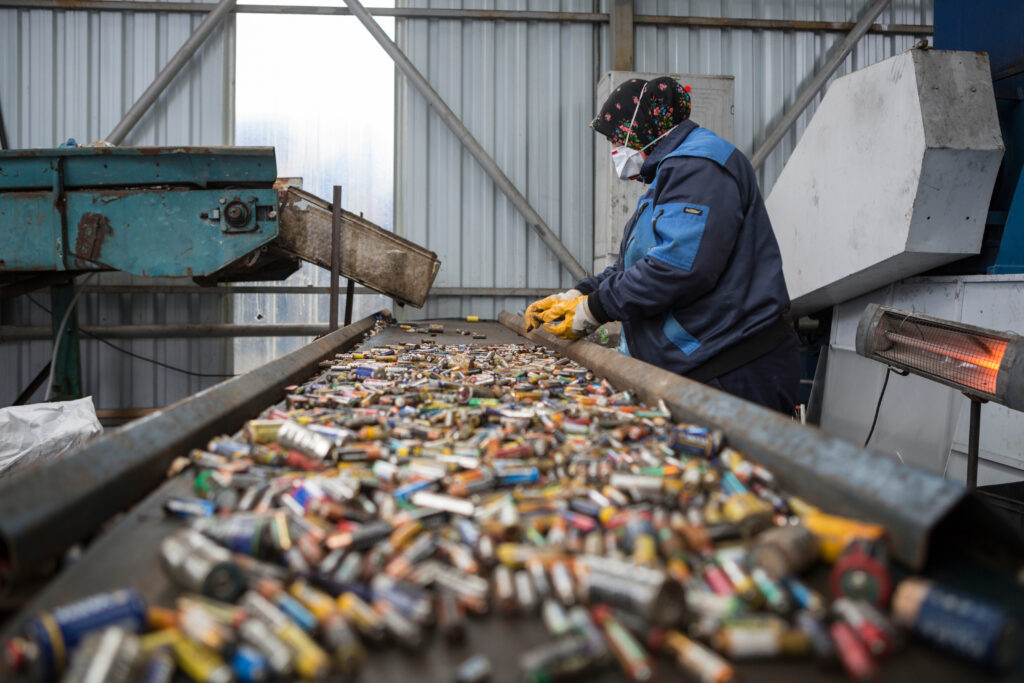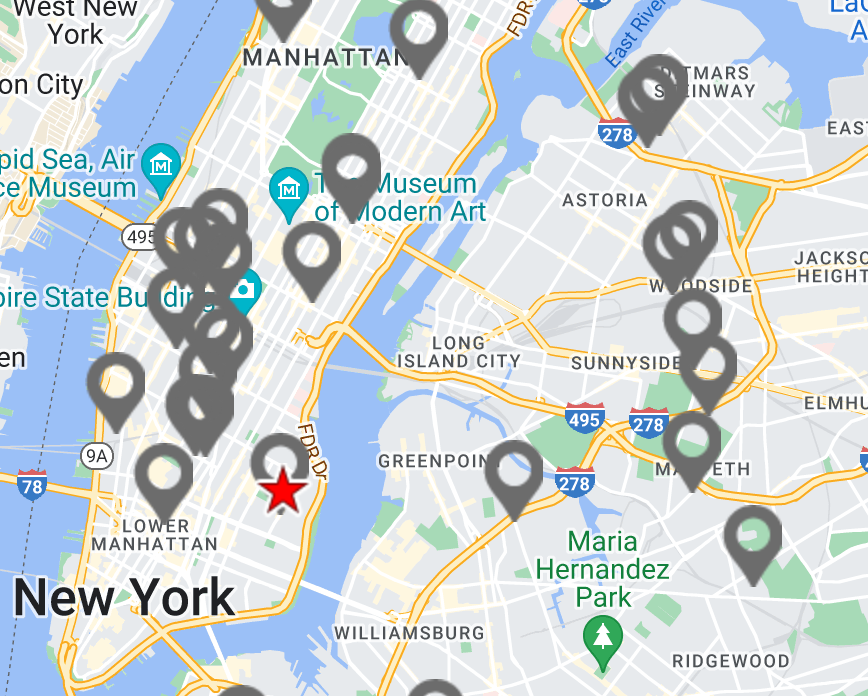In the suburb of Los Angeles where I lived for ten years, the local supermarket shut down the last recycling machine within a ten-mile radius that paid out cash for empty bottles. A handwritten note was taped to the unplugged machine: UNDER NO CIRCUMSTANCES was it okay to leave any bottles there. WE DON’T TAKE ANY BOTTLES BACK!!!!!
And of course, they don’t want my household batteries either.
It’s probably wrong to compare the small Bavarian village where I was raised with life in a metropolis of 13 million people, but the difference in attitudes toward recycling is hard to overstate. After I moved to California, the first time I found myself with a pile of empty plastic containers and used batteries, I naively took them back to the supermarket. When I tried to hand them over, the bewildered cashier looked at me as if I were a Martian. I was equally perplexed. In Germany, every store that sells bottles or batteries is obligated to take them back for recycling.
Don’t get me wrong. I love living in the US, especially in coastal California, which has pioneered some particularly strong environmental protections. But if there was an Academy Award for recycling, Germany, not Hollywood, would take home the Oscar. We Germans are taught to recycle from early childhood, so that it simply becomes second nature. This is why Germany has a trash recycling rate of 56 percent, while Americans recycle less than 35 percent. I cringe at the daily heap of trash my partner and I (two adults, two dogs, no kids) manage to create here, while in Germany, my parents easily fit two weeks worth of trash into one small bin.
But I’m especially mad about the batteries. I am mentally and emotionally incapable of throwing a AA or AAA battery into the trash. Doing so is illegal in Germany, and while I may or may not have done a few illegal things growing up, trashing batteries was never one of them because the EU’s 2006 battery recycling mandatewas for good reason: The little beasts contain heavy metals and acids that leach into groundwater and poison the environment. Moreover, they are chock full of valuable resources (cadmium, mercury, nickel and lithium, to name a few) that we badly need to recover.

Grist recently published an extensive investigation into the looming surge in demand for lithium, which will skyrocket up to 4,000 percent as electric vehicles become the norm. EVs promise cleaner air and fewer emissions, but mining the nickel, cadmium, lithium and other metals for their batteries devastates the environment, often permanently, and requires huge amounts of water. The Guardian, too, worried about the increased demand for lithium “causing needless water shortages, Indigenous land grabs, and ecosystem destruction.”
The only way to avert this, according to a new report from the Climate and Community Project, a progressive climate policy think tank, is by extending public transportation, shrinking the size of EV batteries and “maximizing lithium recycling.” JB Straubel, Tesla’s former chief technical officer must have thought of the latter solution, too, because he left Tesla in 2019 to start a $3.5 billion battery recycling company in Reno, Nevada.
Globally, over 600,000 metric tons of recyclable lithium-ion batteries and related manufacturing scrap were produced in 2021, according to the Technology Review. That number is expected to top 1.6 million metric tons by 2030. I’m sure part of Straubel’s motivation is financial gain but he seems haunted by the outsize proportion of the problem, expecting a “tsunami” of batteries. “I do have this kind of sense of paranoia and urgency and almost — not exactly — panic, that’s not helpful. It really derives from a deep feeling that I don’t believe we’re appropriately internalizing how bad climate change is going to be,” Straubel told the Technology Review. “I generally don’t think we’re going fast enough. I don’t think anyone is.”
Crushed by negative news?
Sign up for the Reasons to be Cheerful newsletter.He expects his new recycling company, Redwood Materials, to produce material for one million lithium-ion EV batteries by 2025, ramping up to five million by 2030. But the U.S. has a lot of catching up to do. The European Union will soon require a minimum amount of recycled lead and lithium in EV batteries, as well as collection targets of up to 61 percent. China already has more than three times the lithium-ion battery recycling capacity of the US and requires battery manufacturers to cooperate with recyclers, thus far outpacing any other nation in the recycling of lithium-ion batteries. It’s a matter of political will and foresight.
In California, when the kitchen drawer couldn’t hold all the used batteries anymore, even after I switched to rechargables, I started storing them in the trunk of my car, ready to jump at the next recycling opportunity should one present itself. I was determined not to miss my chance. I searched recycling websites like Earth911, but batteries were rarely listed, and when I entered my zip code, the site blared error error error. I learned from my online neighborhood group that chain stores like Staples and Best Buy take back batteries, but when I tried, a young sales clerk at Staples reprimanded me with the righteousness of youth, “We only take rechargeable batteries.” Any idea where I could recycle the rest? “How would I know?” she hissed with a disdain that made me realize how outlandish my request sounded. “How do you dispose of your batteries?” I ask my neighbors. Baffled by the question, they answer after a short, stunned pause with the obvious, “We throw them in the trash. Why?”
Even my little German one-horse town with its 250 inhabitants had several recycling containers at the village entry, including separate containers for paper and cardboard, green, white and brown glass, and of course, one for batteries. But in the city of Angels, it seems residents still wonder why Europeans train so doggedly in this fringe sport.
The big day
Finally, the big opportunity I had been waiting for arrived: Our local paper announced the biannual electric household goods collection day. Yippie! I joined the queue in the City Hall parking lot early on a Saturday morning, clutching a dead laptop, an old cellphone and, of course, my bag of batteries. When it was my turn, the man in the blue overalls took my laptop and phone, but recoiled at my battery bag. “Ma’am, we don’t take these!”
“But where can I get them recycled, then?” A shrug was the only answer. I almost wanted to cry.
To be clear, if millions of new EVs roll on the highways by 2030, the expected lithium, cobalt and nickel demand for their batteries can’t be met just through recycling, but so far, as Grist explains, “the Climate and Community Project report points out that recyclers have also had little reason to recover lithium, as it’s cheaper to mine.”
Switching to recycling requires political will and taking the devastating impact of mining more seriously than its price tag. As Straubel said in Technology Review, “It simply can’t work unless you have a closed loop for the raw materials. There aren’t enough new raw materials to keep building and throwing them away.”
There is a happy ending. I finally found a place half an hour drive away, only open on Saturdays, from 9 a.m. until 2 p.m. In many parts of the US, you have to be really, really committed to keeping your household batteries out of the landfill.









